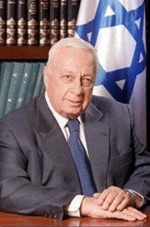-
(单词翻译:双击或拖选)
By Robert Berger
Jerusalem
06 January 2007
It has been a year since former Israeli Prime Minister Ariel Sharon suffered a massive stroke, leaving him in a coma1 that ended his political career. Israelis are still lamenting2 his loss and reflecting on how things might have been had he remained at the helm. Robert Berger reports from VOA'S Jerusalem bureau.
 |
| Ariel Sharon |
Mr. Sharon's successor, Prime Minister Ehud Olmert, has been harshly criticized for his handling of the war, and his popularity has plunged3. A recent poll showed that 77 percent of Israelis disapprove4 of his performance.
That has raised questions about whether the popular Mr. Sharon, a former general and war hero, would have done things differently.
"In essence, what you had after he was incapacitated was like Murphy's Law: If anything can go wrong it will go wrong," said Ra'anan Gissin, who was Mr. Sharon's adviser5 for 10 years. "And the war went wrong, or at least not as we expected. If Sharon was there today, at least there would have been a sense of direction."
But Mr. Sharon also has his critics. Many Israelis say his term went downhill after he pulled Israel out of the Gaza Strip in 2005. Yaffa Reuveni, a teacher in Jerusalem, told VOA that Sharon's expulsion of 8,000 Gaza settlers was inexcusable.
"He was very cynical6. He make [made it] very bad for [a] lot of people. [A] lot of people are without money, without home, without work and I don't agree with this," said Reuveni.
While Israelis debate Ariel Sharon's legacy7, there is little disagreement that he would have handled the war in Lebanon more prudently8 than Mr. Olmert, who has little military experience. Gissin says Mr. Sharon would not have gone to a war he could not win.
"If he was awake today and in his full capacity, I doubt very much that the developments that took place would have taken place," he added. "In other words, the fact that the war in Lebanon went as it was. Maybe there wouldn't have been a war in Lebanon."
A popular joke making the rounds has Mr. Sharon waking up from his coma. When he finds out that people with no security experience are now prime minister and defense9 minister, he is utterly10 dismayed and decides to go back to sleep.
 收听单词发音
收听单词发音
1
coma

|
|
| n.昏迷,昏迷状态 | |
参考例句: |
|
|
|
2
lamenting

|
|
| adj.悲伤的,悲哀的v.(为…)哀悼,痛哭,悲伤( lament的现在分词 ) | |
参考例句: |
|
|
|
3
plunged

|
|
| v.颠簸( plunge的过去式和过去分词 );暴跌;骤降;突降 | |
参考例句: |
|
|
|
4
disapprove

|
|
| v.不赞成,不同意,不批准 | |
参考例句: |
|
|
|
5
adviser

|
|
| n.劝告者,顾问 | |
参考例句: |
|
|
|
6
cynical

|
|
| adj.(对人性或动机)怀疑的,不信世道向善的 | |
参考例句: |
|
|
|
7
legacy

|
|
| n.遗产,遗赠;先人(或过去)留下的东西 | |
参考例句: |
|
|
|
8
prudently

|
|
| adv. 谨慎地,慎重地 | |
参考例句: |
|
|
|
9
defense

|
|
| n.防御,保卫;[pl.]防务工事;辩护,答辩 | |
参考例句: |
|
|
|
10
utterly

|
|
| adv.完全地,绝对地 | |
参考例句: |
|
|
|















